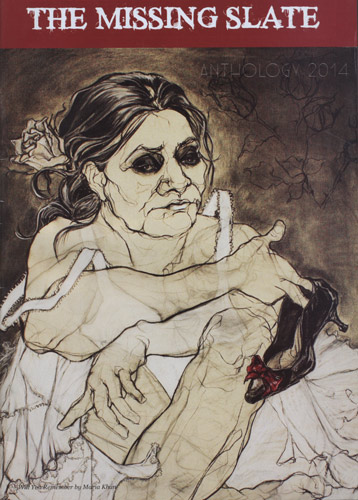The Missing Slate – 2015
The Missing Slate, based in Islamabad, Pakistan, is an ambitious gathering of ideas from around the world in the form of poetry, essays, and stories, accented with dazzling artwork. This is the first print anthology from the previously online-only forum. The Missing Slate, based in Islamabad, Pakistan, is an ambitious gathering of ideas from around the world in the form of poetry, essays, and stories, accented with dazzling artwork. This is the first print anthology from the previously online-only forum.
The contents are in English, though some translated poems pair with their original versions. The magazine’s website explains its title: “Because slates are still used to write and teach in most rural Pakistani villages, it felt fitting for the magazine to be called The Missing Slate, finding and publishing voices our editors felt were important to a discerning reader.”
So take a chance. Expand your notion of literature. Read what you might not find elsewhere.
Maria Amir expands the notion of freedom in her essay “Free Falling”: “Negotiating ‘freedom’ is an intense and self-defeating exercise in absolutes. [ . . . ] Naturally, different societies do this in different ways and this is why, as a species, we are nowhere near achieving the freedoms we already allegedly possess.”
“Israel’s Continuing Colonialism: The 2014 Gaza invasion,” by Jessica McHugh, profiles countries in crisis. The pull quote: “An Important part of this struggle is not just the more widely publicized attacks on Palestinians, [ . . . ] but simply the daily indignities of being treated as a prisoner in your own country.”
A darker story by Shahaduzzaman, “Whatever the Wounds, Whatever the Damage,” evolves around a gang rape. A naïve young woman, Mamtaz, is attacked on a bus, and following treatment by a female doctor, a male doctor destroys the medical report. He orders the female physician to “write a new report” and “write quite clearly, ‘There is no sign of recent intercourse.’”
It’s not all tough issues. Scottish writer Fiona Inglis writes in “Hair, Cuts”: “There’s nothing worse than taking a trip to a friend or lover’s bathroom, only to be met with a short, wiry hair on the toilet seat or stuck to the side of the bath.” She follows this with detailed progress of a certain ingrown hair.
Mahnoor Yawar in “USS: The Uncertain State of Superheroism” captures “the forever mutating political and social relevance of superheroes.” Who knew, besides comic devotees, that Superman rescued Santa Claus from Germany during the 1940s war years?
Superheroes were, after all, designed to represent the very ideals of what humanity could strive towards, but perhaps those ideals have altered and multiplied since. When major social change occurs, our heroes must change with them. The heroes that live in fiction are no different.
Chuck Williamson and Rhea Cinna both look at cinema: Williamson’s essay, “Deconstructing the Dream Factory,” involves 1920s movie star scandals and fan magazines, and Cinna’s “Passage Through the Zone” analyzes Andrei Tarkovsky’s 1979 movie “Stalker.” She writes, “It is likely that in Tarkovsky’s vision, if the world were to reinvent itself centuries from now, art would point to its new direction, immortalize the change, and shape the challenge for the future both as a result of its time and as its greatest inspiration.”
Poems in this magazine are many and varied. Desmond Kon Zhicheng-Mingdé’s prose poem is titled “Găn Qíng Yòng Shì :: Impulsive and Impetuous,” and Texas resident Anis Shivani writes a pantoum “Alexandria in World War II.”
Lebanese-Australian poet Wadih Sa’adeh’s “Hey Allen Ginsberg, I Think That the Fan is Rotating” is transcribed from Arabic. Among other languages represented in this issue are German, Slovak, Persian, Bulgarian and Urdu.
Now here’s an intriguing line: “The twins had been handed down in our family for generations because we couldn’t get rid of them.” It’s from Kuzhali Manickavel’s entertainingly surreal story “The Twins.” “Nobody knew much about them, except that they looked like small grey stones when they were sleeping. Their skin split when they were upset, their limbs were prone to breaking and seeds sometimes took root in their skin.”
Hira A. brings to light “the trials and tribulations of a well-endowed woman” : “my breasts offend my father / even more than my opinions.” She ends:
[ . . . ] I envy them
their delicates that actually
look delicate; mine, all hefty
cotton and industrial-strength
underwire, look just like armor.fortunately, though, the man I love
loves warriors.
The Missing Slate hits the mark with this issue, collecting new voices from around the world in one place. Take that chance, and pick up your own copy today.
[www.themissingslate.com]





